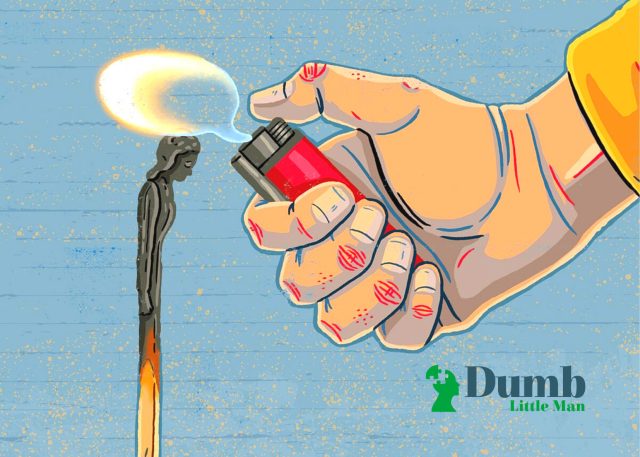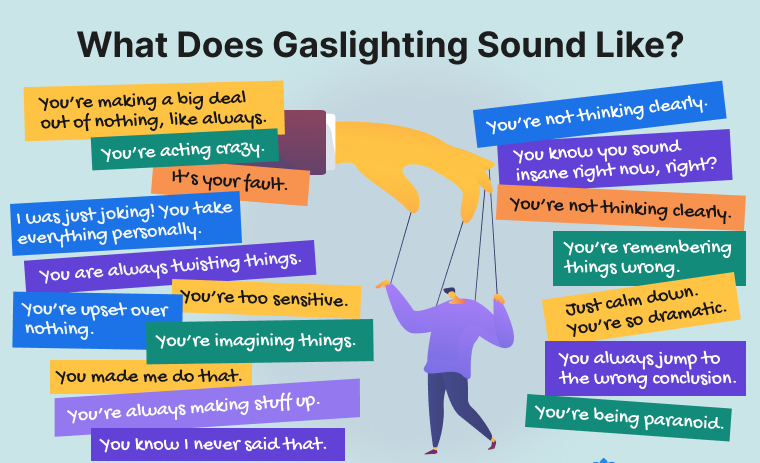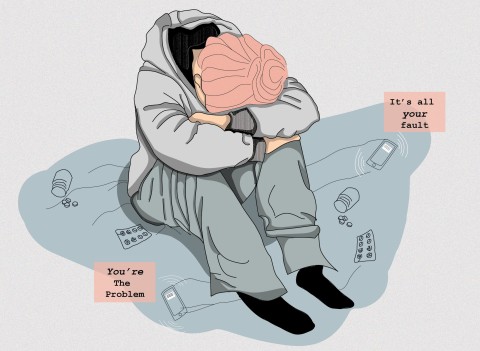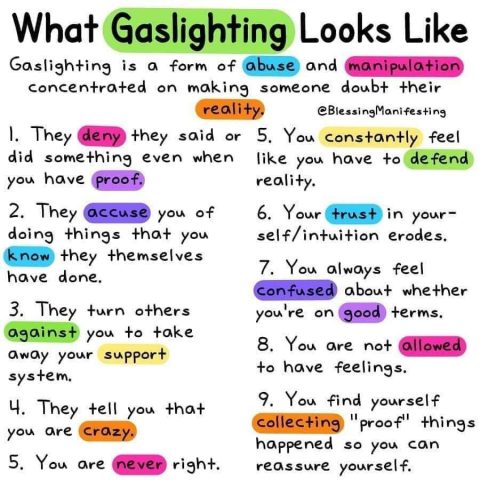Tell-Tale Signs Of Unconscious Gaslighting: Are You The Hunter Or The Hunted?
By Dumb Little Man
January 10, 2024

“Oh come on! give me a break. I never said that.”
“You’re just being sensitive.”
“I don’t know why you’re making such a big deal out of this…”
Gaslighting is a term psychologists use to refer to a specific type of manipulation. Gaslighting is a form of mental abuse where the abuser makes or is trying to play mind games via feeding false information to get someone else (or a group of people) to question their own thinking, reality, memory, or perception. The abusers will lie through their teeth and intentionally set you up to fail. They will say and do things and later deny they ever happened. They will undermine you, manipulate you, and convince you that you are the problem. And it’s always a serious matter and problem, according to psychologists.
“The danger of letting go of your sanity and reality is pretty harmful and extreme,” Robin Stern, Ph.D., Co-founder and Associate Director for the Yale Center for Emotional Intelligence and an Associate Research Scientist at the Child Study Center at Yale and author of “The Gaslight Effects,” in her book she reiterates that “It is always dangerous.”
It may start out seemingly with innocent behaviors and small offenses. But the problem is that even more-or-less insignificant instances of you questioning your own judgment, own behavior, own intention, or reality thanks to the deliberate intent of other people — can hijack.
You can end up in a cycle of not being able to negotiate your daily difficult predicaments and situation in life in a way where you are aware, clear-minded, can focus, can make sound decisions, and have a sense of well-being in one’s own actions, Stern says.
Gaslighting tactics happen in personal relationships (think an abusive spouse or, in rarer cases, parent), in professional relationships (a manipulative head/boss or coworker preying on a junior or associate), and even by public figures like social media influencers. There are several examples of this phenomenon is done which even politicians use in their propaganda and in their administration campaigns, Stern notes.
No matter whether it’s happening in a marriage, between a boss and his or her constituents or elsewhere, it’s important to be fully aware of the red flags that you (perhaps someone you know) might be a victim- which is the first step to getting out of the abusive and stressful situation.
Gaslighting Is Guilt-tripping
Gaslighting has become a publicized term nowadays, the term was first coined after the play “Gas Light” which was later adapted to film in America in 1944. The story was centered on a husband who attempts to isolate his wife and make her believe she is insane. To do so, he went on to dim and brighten the gaslights and then insist she was only imagining it. Since then the term has been applied in conversations pertaining not only to partners but also to kin members, relatives, people from work, and even to government officials. But what does it really mean and how can we know if we’re being gaslighted?

The fatal toxin of gaslighting is to instill self-doubt and to deceive. So when the wife Mrs. X, a notorious gaslighter, is trying to make her husband Mr. X believe that he has not been a faithful person all this time. And Mr. X being a womanizer in his teenage years and has now some guilt-tripping to make.
But the thing is, Mr. X would know if he’s cheated on Mrs. X or not and he knew ever since he got married he never looked at other women. With his dignified conscience and honesty intact. At this point, it’s not even a debate on the truth. Mr. X knows he was faithful to his wife in their marriage. But because of his past mistakes, he is again guilt trip to thinking of his past life. He knows, for sure, he’s been faithful. Then Mrs. X is making him question himself. So he’ll be like, ‘Wait, I haven’t cheated my wife? or did I? I now have to cancel the invitation of my boss because my wife is having trust issues with me now?” Mr. X to his frustrations will now experience paranoia to the point that he will never know that it was Mrs. X who’s been having an affair with another man in the first place.
Gaslighting, Through The Numbers
In a study that was published last 2019 According to by the American Sociological Review study called “The Sociology of Gaslighting” unconscious gaslighting uses physical and verbal incidents of abuse to create a sense of lost reality and confusion. The study theorized that this phenomenon is rooted in social inequalities, including gender. The study suggested: Structural vulnerabilities, gender, nationality, and sexuality create the terrain and platform upon which gaslighting tactics become successfully convincing and damn right effective.
The women who participated in that said study described their abusers as “twisting” reality, and even “changing facts.” Abusers also made them feel “delusional” and associated their partner’s lack of reason as a “feminine quality.”
Unconscious gaslighting doesn’t just occur in romantic relationships where one’s self esteem is important. Gaslighting can happen everywhere. It can be parent and child, it can be between any two people. If you think about it, we can even go bigger — in society, governments (politicians) with the help of the media can gaslight its people and win their way to the elections.
Gaslighting Versus Lying
You wouldn’t believe it, but there is a very minute line and slight distinction. So minute that it is hard to distinguish unless a proper context is given to note between the two.
The logic goes far as “Not all lying is necessarily gaslighting, but when you make someone else doubt what they saw and doubt what they say, then that’s what makes it gaslighting.”
Some psychologist explains that sometimes, people just have different experiences of the same phenomenon and have disagreements.
Case in point: A married couple having different interpretations of an experience, for example having an affair. Mr. and Mrs. X disagrees about the incident where Mr. X was caught by Mrs. X having dinner with her secretary. Is that considered cheating?’ We now see a grey area and blurred lines from just a mere analysis.
Having a different interpretation is different from gaslighting, and this is where people often get things wrong gaslighting is being misused or overused because the interpretation is different. The Grey area is different. The Blurred lines are different from gaslighting and again the interpretation is different.
To give context, here’s another example: You saw your husband in a restaurant with his secretary. You confront your husband about cheating but your husband denies it because for him it was a celebration for a promotion, having dinner in a restaurant is not cheating. What transpired is a difference in interpretation.
But if the husband denies it, saying it wasn’t him, the wife saw at the restaurant or that the wife was imagining things and was delusional, and when the wife begin to question and became uncertain of what she saw, still that’s gaslighting. Furthermore, the husband knew that he went out with his secretary. His wife caught him. So he’s going to tell her she’s insane and jealous. And from there still a classic example of gaslighting. Because that’s really the truth and the nail to the coffin is that he’s going to make her think she’s crazy and that she was the one who’s seeing someone else for going out late at night and that he was just having a dinner with his secretary.
Sabotaging Your Self-Esteem

Much of how we feel about ourselves comes from how other people treated us and these people could be our family members and friends. It burrows into our own memory and sanity and in turn causes doubt and victim question.
But as we get older, we realize how we don’t want to be a treated into the receiving end and we shouldn’t accept anything short of what we want. It’s incredibly important for our own mind and self-esteem that we draw the lines and create boundaries for how other people are allowed to treat us.
Letting an unconscious gaslighter harm and walk all over us, and keeping regular contact with people who happened to disrespect us reinforces our negative feelings.
Identify some ways people have made you feel hurt and bad about yourself in the past that brought you to this sticky situation, and try to seek and remember them so that you can react differently in the future.
Each person present in our relationship, friendship, co-worker or family member are in our lives to participate in lessons we share together in an effort for our souls and personalities to grow and develop.
Let people know how they’re making you feel if you believe that they’re not lying and that they respect you enough to stop any infliction of harm, hurtful and disrespectful behavior towards you.
And if that isn’t enough to get them to stop, then you don’t need that person in your life and truly should move on to others who will want to respect you.
It happened to be difficult to walk away from people, we feel the denial especially people we’re close with, like friends or family. But protecting your own sense of self-worth is more important than maintaining a harmful lying relationship. When the offending person decides to respect the way you’ve asked to be treated, then they can become part of your life again.
Emotional Abuse Tactics, And How You Can Avoid Being One
Almost everyone has felt subject to unconscious gaslighting at one time or another, but no one wants to think of themselves as an unconscious gaslighter or worst being deemed as a manipulative person and narcissistic.
But some behaviors are so common, you could be engaging in passive-aggressive coercion without even realizing it. It’s very important to be aware of this phenomenon. It’s a form of emotional abuse. Emotional abuse is real! It’s damaging! It’s draining! Make clear boundaries with people who are not good for your mental health. Period.
Unconscious gaslighting effects in its essence is a sticky situation, which can take many different forms, from the silent treatment (avoid triggering) to a more subtle manipulative form.
Essentially, it’s getting someone to do or think something without addressing it directly. It’s strategic manipulation. The harm and problem are that indirect communication can cause problems in personal relationships of all kinds, including with your family, love life, colleagues, and friend group.
Habitual manipulative and unconscious gaslighting behavior can lead to bad blood and distrust over time because it may force the victim and recipient to do things they don’t want to do by putting them into a position that’s hard to simply say no to. When this happens frequently, it results in resentment and hatred.
Here are some habits that you could be guilty of, and better ways to navigate the situation, to improve the health of your relationships.
1. But wouldn’t you like a…?
One simple example comes in the form of an “innocent” suggestion, which is when somebody suggests something instead of really saying what they’re feeling or thinking. For instance, if you’re on your way to a friend’s place and text them saying, “Don’t you want some beer? I’ll pick up a six-pack,” when perhaps you know your friend isn’t a beer drinker himself, but the truth is, you could totally go for a chug or two. The tactic at play is making your own idea or desire seem like someone else’s, when a more genuine way to phrase your desires would simply be: “I think I want some beer after dinner; would you be interested in trying?”
2. Sure, up to you totally, but…
A similar habit is to present someone with a choice when you’ve already decided what you want. For example, asking your spouse or partner which of two movies they’d rather see, then explaining why one option is better, but maintaining that the choice is still theirs. One potential phrasing for this false-choice scenario: “I’m totally open—but this movie is much more historical, and we could probably learn a lot.”
3. I forgot again….
If you’ve ever, so willingly “forgotten” to do a shared task like a household chore because it was late, you were tired and exhausted, or you just didn’t feel like doing it, you wouldn’t be alone. But if you’re consistently leaving your partner or roommates with the dishes, or leaving your colleagues or classmates to pick up your slack with team projects, you may want to check yourself. Perpetually failing to pick up the slack with things that affect everyone is just unfair, and if you really are too tired or swamped, you should talk about it. It’s better to honestly discuss what needs to be done and communicate about ways things can be handled. If you pressure someone to do something in an indirect way that’s like to induce feelings of guilt, that’s an ineffective way of asking for help.
4. Promises, promises, and a bunch of promises
Overpromising is another intentional behavior, it identifies as one that can be manipulative too. This could be in the form of overselling or hyping an event you want a friend to go to (“It’ll be incredible! Lady Gaga is on the guest list!”) or offering a bargain (“I’ll make dinner every night this week!”) without following through. But when your end of the deal isn’t upheld once you’ve heightened the expectations, the other party is going to be disappointed or angry, and might feel deceived. Tip is, Be direct, and if your friend or partner doesn’t want to do something, honestly explore what is going on. Ask why, and most importantly, don’t try to strong-arm them into doing what you want.
5. I’ll just do it myself…
Casting oneself in the role of martyr can be a way to get others to do what you want, albeit an unhealthy way. If you pressure someone to do something in an indirect way that’s likely to induce guilt, that’s an ineffective way of asking for help when you need it. Phrasing your needs like, “If you don’t do this, then something bad is going to happen, but it’s not big deal,” is gaslighting and manipulative in a very wrong way.
6. Deafening silence
Believe it or not, saying nothing can be emotionally coercive as well in a difficult situation. When you deal with a conflict, or even a feeling of being wronged that goes undiscussed by not talking about it, you leave the person with few options other than to try to appease you. It’s often done to succumb them into an apology. It’s okay to take some time and cool off these feelings, but when it’s long and overdue, it can be manipulative and gaslighting, as it forces the other to give in.
The irony is that this phenomenon and behavior often comes from a place of hurt. People are unknowingly gaslighting and manipulating when they use silence as a weapon. It’s an ineffective way of dealing with the hurt. It’s always better to clear the air; that way, your friend or partner has a chance to explain their behavior without buckling to an apology and imagining things that they might not feel is due, which can lead to resentment down the line.
They Make You Believe That Everyone Is A Liar
A skilled emotional conscious or unconscious gaslighter will eventually lead to an emotional manipulator who can destroy your self-esteem and even make you question your own sanity.
It’s precise because gaslighting and manipulation are just two examples of emotional abuse tactics that can be so destructive that it’s important for you to recognize them in your own life. It’s not as easy as you might think, because gaslighters’ manipulators are typically very skillful.
They start out with subtle gaslighting and manipulation and raise the stakes over time, so slowly that you don’t even realize it’s happening. Fortunately, these wrongdoers are easy enough to spot if you know what to look for. And if you are one, please stop gaslighting.
1. They undermine your faith in your grasp of reality
Gaslighters and manipulators are incredibly skilled liars. They will constantly call you crazy and make you feel like there’s something wrong with you. They will even go beyond as to say you are having some mental illness meltdown . They insist an incident didn’t happen when it did, and they insist they did or said something when they didn’t. The trouble is they’re so good at it that you end up questioning your own sanity. To insist that whatever caused the problem is a figment of your imagination is an extremely powerful way of getting out of trouble.
2. Their actions don’t match their words
They wear you down over time. So you accept all the things they say about you. They will tell you what you want to hear too, but their actions are another story. They pledge their support, but, when it comes time to follow through, they act as though your requests are entirely unreasonable. They tell you how blessed and lucky they are to know you, and then act as though you’re a burden. This is just another way of undermining your belief in your own capacity. They make you question reality as you see it and mold your perception according to what is convenient to them.
3. Decent human being but experts at doling out guilt
Gaslighters are masters at leveraging your guilt to their advantage. If you bring up something that’s bothering you, they make you feel guilty for mentioning it. If you don’t, they make you feel guilty for keeping it to yourself and stewing on it. When you’re dealing with gaslighters, whatever you do is wrong, and, no matter what problems the two of you are having, they’re your fault. They sometimes use your kin against you. This breaks you down even further emotionally.
4. They respond and claim the role of the victim
When it comes to gaslighters in general, nothing is ever their fault. No matter what they do — or fail to do — it’s someone else’s fault. Someone else made them do it, and usually, it’s you. If you get mad or upset, it’s your fault for having unreasonable expectations; if they get mad, it’s your fault for upsetting them. Gaslighters don’t take accountability for anything.
5. They are too many, too soon
Whether it’s a personal relationship or a business relationship, gaslighters always seem to skip a few steps. They share too much too soon — and expect the same from you. They portray vulnerability and sensitivity, but it’s a ruse. The charade is intended to make you feel “special” for being let into their inner circle, but it’s also intended to make you feel not just sorry for them but also responsible for their feelings.
6. The other person is a trap
Whatever gaslighters are feeling, they’re geniuses at sucking and trapping everyone around them into those emotions. If they’re in a bad mood, everyone around them knows it. But that’s not the worst part: They’re so skillful that, not only is everyone aware of their mood, they feel it too. This creates a tendency for people to feel responsible for the manipulator’s moods and obliged to fix them.
7. They act like a martyr
An initial eagerness to help swiftly turns into sighs, groans, and suggestions that whatever they agreed to do is a huge burden. And, if you shine a spotlight on that reluctance, they’ll turn it around on you, assuring you that, of course, they want to help and that you’re just being paranoid. The goal? To make you feel guilty, indebted, and maybe even crazy.
8. They always windup you
No matter what problems you may have, gaslighters have it worse. They always have an effective way to undermine the legitimacy of your complaints by reminding you that their problems are more serious. The message? You have no reason to complain, so shut the heck up.
9. They know you
Sometimes gaslighters know your weak spots too, and they’re quick to use that knowledge against you at point-blank. They know what words to use against you or for you. If you’re insecure about your weight, they’ll comment on what you eat or the way your clothes fit and if you’re worried about an upcoming presentation, they point out how intimidating and judgmental the attendees are. Their awareness of your emotions is off the charts and totally textbook, but they use it to manipulate you, not to make you feel better.
Gaslighting Doesn’t Happen Overnight
Unintentional gaslighting usually happens in a bid for a power struggle, on the other hand, it’s not always intentional or malicious.
There usually tends to be a denial and power struggle when gaslighting happens. The manipulator (conscious gaslighter and unconscious gaslighter) holds enough power that the single person or target of receiving end of gaslighting is terrified to recognize, respond and change up the relationship or step out of the gaslighting dynamic because the threat of losing that relationship or the threat of being seen as less than who you want to be seen as to them is quite a threat and instills self-doubt.
If it’s happening, by any human decent being or someone you love and care about like a spouse, family, or another person, you’re going to want to acknowledge and believe the other person, and the gaslighter may use that false information against you.
Most people who are unable to acknowledge in the course of their lives are constantly targeted by gaslighting change their perceptions in order to avoid having a conflict
Unintentional gaslighting doesn’t happen overnight too. Unintentional gaslighter, instead they repeatedly misguide and seek to manipulate you and wear your emotions down.
You are a decent human being capable of love and even if you feel estranged by them (gaslighters). Reach out to them, inform them of their wrongdoings and form strong barriers for yourself. Stop being their victim and change the course of their action and behavior.

Dumb Little Man
At Dumb Little Man, we strive to provide quality content with accuracy for our readers. We bring you the most up-to-date news and our articles are fact-checked before publishing.


